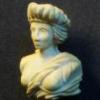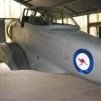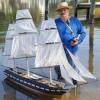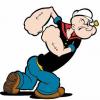Supplies of the Ship Modeler's Handbook are running out. Get your copy NOW before they are gone! Click on photo to order.
×
-
Posts
5,195 -
Joined
-
Last visited
Reputation Activity
-
 michael mott reacted to Piet in Cutty Sark by NenadM
michael mott reacted to Piet in Cutty Sark by NenadM
I understand the process for the portholes Nenad but thought you could have used shoe lace grommets.
Copper wire works
Cheers,
-
 michael mott reacted to NenadM in Cutty Sark by NenadM
michael mott reacted to NenadM in Cutty Sark by NenadM
Faced with simillar ideas as tatoo, I remembered me as hipy with long hair (believe or not, I had hair once upon a time), psyhodelic music, sitting always on floor, picking my guitar everyehere ... Flower power etc etc ... On that time, we were from another planet for our parrents ... And life learned me - everything will be ok, just let them be mad for a while, they have right to be young and insane, just as we did, but in their own way
-
 michael mott reacted to Mirabell61 in Cutty Sark by NenadM
michael mott reacted to Mirabell61 in Cutty Sark by NenadM
nice work Nenad,
I also like your scetches when you plan and bring your thoughts and ideas to paper...
Nils
-
 michael mott reacted to NenadM in Cutty Sark by NenadM
michael mott reacted to NenadM in Cutty Sark by NenadM
Hello David
Just a improvisation - lazy and impatient Nenad. It can be done much much better with brass wire and a bit of soldering
Here is "the last technology" process
I hope you can manage in my fast hand drawing
-
 michael mott reacted to pete48 in Buzzards Bay 14 by pete48 - FINISHED - 3/4" = 1' scale - SMALL - L.F. Herreshoff design
michael mott reacted to pete48 in Buzzards Bay 14 by pete48 - FINISHED - 3/4" = 1' scale - SMALL - L.F. Herreshoff design
Last night and this morning, I installed the planks that make up the Keel, and then installed the Garboard, I then sanded them with 220 grit sandpaper. Next will be to install the Sheer Strake and plank the Hull. Here are the results
-
 michael mott reacted to pete48 in Buzzards Bay 14 by pete48 - FINISHED - 3/4" = 1' scale - SMALL - L.F. Herreshoff design
michael mott reacted to pete48 in Buzzards Bay 14 by pete48 - FINISHED - 3/4" = 1' scale - SMALL - L.F. Herreshoff design
Michael, did you take out Maria this summer? I already miss going Sailing
Thank you Mark, I was fortunate to grow up around a few of these, In Port Townsend WA, ( when I was older ) I saw one that was breathtakingly Beautifully built, I modeled the rear deck on the last one after it.
The Building jig is made from 1 X 6 Pine ( actual size is 3/4" X 5 1/2" ), the Blocks are made from 1/2" X 1/2" Birch ( varying lengths based on the width of the frames ) The Frames are made from 3/32" basswood, Keel sections are 1/8" Basswood, the planking will be 1/4" X 1/16" Basswood, the Transom is a Birch ply.
Thank you Bob, One of the details that I would like to achieve on this one is a more accurate Keel shape, I think that this one will be dialed in, with all the elements from the first 2. I thank you for the tip on the 12 1/2 Kit, I am actually considering buying a set of Plans for the 12 1/2 from Mystic Seaport, ( the offset table is blacked out ) However I read in wooden boat ( many years ago ) that what Francis had done was take his father's ( Nate) 12 1/2 and stretch the waterline to 14 ft. with the same beam. So with some reverse engineering and overlaying the frames from the 2 boats (from the lines Drawing ) I could get a offset table for the 12 1/2 ( in theory ) I would love to build full scale again ( its been at least 20 years )
Best Regards,
Pete
-
 michael mott reacted to Omega1234 in Majellan by Omega1234 - FINISHED - 1/200 - Luxury 37 m Motor Yacht - Miniature
michael mott reacted to Omega1234 in Majellan by Omega1234 - FINISHED - 1/200 - Luxury 37 m Motor Yacht - Miniature
Hi everyone
Thanks for your comments and Likes! Greatly appreciated.
I couldn't resist...I was pretty keen to see what the colour combination of gloss black on the topside and Matt blue on the under hull would look like. So, I roughly taped it off with Tamiya tape and painted the bottom. It's a rough job, but I can always do it properly later on. At this stage, I'm more interested in just seeing what it'd look like. Not bad, I thought.
I also cut the lower deck and main deck templates. These will prove invaluable in helping to get the internal layout right.
Here are the results, so far.
Cheers
Patrick
-
 michael mott got a reaction from archjofo in Bristol Pilot Cutter by michael mott - 1/8 scale - POF
michael mott got a reaction from archjofo in Bristol Pilot Cutter by michael mott - 1/8 scale - POF
Thanks for all the positive comments and other feedback.
I made a start on the hinges, they are cut from .010" brass sheet. scales out to roughly .078 which is 14 gauge sheet. which seems reasonable enough.
the strip was annealed by heating to red and then quenching in water, I could have let it cool down on its own and would have the same result.
then it was folded over on itself in the milling vice with a length of .032" steel rod to support the rounded portion after the fold was nearly complete I set the folded metal so that as the vice squeezed the brass it pushed the steel rod upwards to form the full round, similar to what we do when we wrap a piece of paper around a dowel and then pinch it to become tight our finger slide a little as the paper closes together.
A couple of pieces were cut off using the jewelers saw with a #7 blade the finest I have. The notches were filed out with needle files with some brass .032 rod inside as support.
next I used the jewelers saw to cut off the folded flap close to the rounded portion, in order to lessen the flex of the blade I shortened the throat of the saw to approx 3 inches.
Once all the rest are cut and assembled I will use the drill press to drill and countersink the holes. Just 7 more to go.
Gee the close ups are brutal they show every flaw.
The pieces were assembled and then squared up with a 6 inch #4 flat file
Michael
-
 michael mott got a reaction from PeteB in Bristol Pilot Cutter by michael mott - 1/8 scale - POF
michael mott got a reaction from PeteB in Bristol Pilot Cutter by michael mott - 1/8 scale - POF
Thanks for all the positive comments and other feedback.
I made a start on the hinges, they are cut from .010" brass sheet. scales out to roughly .078 which is 14 gauge sheet. which seems reasonable enough.
the strip was annealed by heating to red and then quenching in water, I could have let it cool down on its own and would have the same result.
then it was folded over on itself in the milling vice with a length of .032" steel rod to support the rounded portion after the fold was nearly complete I set the folded metal so that as the vice squeezed the brass it pushed the steel rod upwards to form the full round, similar to what we do when we wrap a piece of paper around a dowel and then pinch it to become tight our finger slide a little as the paper closes together.
A couple of pieces were cut off using the jewelers saw with a #7 blade the finest I have. The notches were filed out with needle files with some brass .032 rod inside as support.
next I used the jewelers saw to cut off the folded flap close to the rounded portion, in order to lessen the flex of the blade I shortened the throat of the saw to approx 3 inches.
Once all the rest are cut and assembled I will use the drill press to drill and countersink the holes. Just 7 more to go.
Gee the close ups are brutal they show every flaw.
The pieces were assembled and then squared up with a 6 inch #4 flat file
Michael
-
 michael mott got a reaction from JerryTodd in Bristol Pilot Cutter by michael mott - 1/8 scale - POF
michael mott got a reaction from JerryTodd in Bristol Pilot Cutter by michael mott - 1/8 scale - POF
Thanks for all the positive comments and other feedback.
I made a start on the hinges, they are cut from .010" brass sheet. scales out to roughly .078 which is 14 gauge sheet. which seems reasonable enough.
the strip was annealed by heating to red and then quenching in water, I could have let it cool down on its own and would have the same result.
then it was folded over on itself in the milling vice with a length of .032" steel rod to support the rounded portion after the fold was nearly complete I set the folded metal so that as the vice squeezed the brass it pushed the steel rod upwards to form the full round, similar to what we do when we wrap a piece of paper around a dowel and then pinch it to become tight our finger slide a little as the paper closes together.
A couple of pieces were cut off using the jewelers saw with a #7 blade the finest I have. The notches were filed out with needle files with some brass .032 rod inside as support.
next I used the jewelers saw to cut off the folded flap close to the rounded portion, in order to lessen the flex of the blade I shortened the throat of the saw to approx 3 inches.
Once all the rest are cut and assembled I will use the drill press to drill and countersink the holes. Just 7 more to go.
Gee the close ups are brutal they show every flaw.
The pieces were assembled and then squared up with a 6 inch #4 flat file
Michael
-
 michael mott got a reaction from IgorSky in Bristol Pilot Cutter by michael mott - 1/8 scale - POF
michael mott got a reaction from IgorSky in Bristol Pilot Cutter by michael mott - 1/8 scale - POF
Thanks for all the positive comments and other feedback.
I made a start on the hinges, they are cut from .010" brass sheet. scales out to roughly .078 which is 14 gauge sheet. which seems reasonable enough.
the strip was annealed by heating to red and then quenching in water, I could have let it cool down on its own and would have the same result.
then it was folded over on itself in the milling vice with a length of .032" steel rod to support the rounded portion after the fold was nearly complete I set the folded metal so that as the vice squeezed the brass it pushed the steel rod upwards to form the full round, similar to what we do when we wrap a piece of paper around a dowel and then pinch it to become tight our finger slide a little as the paper closes together.
A couple of pieces were cut off using the jewelers saw with a #7 blade the finest I have. The notches were filed out with needle files with some brass .032 rod inside as support.
next I used the jewelers saw to cut off the folded flap close to the rounded portion, in order to lessen the flex of the blade I shortened the throat of the saw to approx 3 inches.
Once all the rest are cut and assembled I will use the drill press to drill and countersink the holes. Just 7 more to go.
Gee the close ups are brutal they show every flaw.
The pieces were assembled and then squared up with a 6 inch #4 flat file
Michael
-
 michael mott got a reaction from PeteB in Bristol Pilot Cutter by michael mott - 1/8 scale - POF
michael mott got a reaction from PeteB in Bristol Pilot Cutter by michael mott - 1/8 scale - POF
Druxey, Bob, Ian, Steve, thanks for your positive comments, and all who pressed the like button.
I finished rough sanding the four lights and am starting to work on the cleats with the bars that protects the Lexan.
after cutting the cleats they were drilled with an .046 drill to accept some 3/64th brass rod 3/8 scale size.
the cleats were then given an initial shaping, by stacking them on foundation with 2 sided tape to sand them
after assembling the first one the bars looked a bit small so I up sized them to 1/2 inch (1/16) but did not want to re-drill the holes. after cutting the copper tube to length I inserted some 1/32 brass rod in each end and gave the tube a gentle squeeze with some round nosed pliers to hold the rods in place.
I am thinking that the copper looks better anyway.
Michael
-
 michael mott got a reaction from popeye the sailor in Bristol Pilot Cutter by michael mott - 1/8 scale - POF
michael mott got a reaction from popeye the sailor in Bristol Pilot Cutter by michael mott - 1/8 scale - POF
Thanks for all the positive comments and other feedback.
I made a start on the hinges, they are cut from .010" brass sheet. scales out to roughly .078 which is 14 gauge sheet. which seems reasonable enough.
the strip was annealed by heating to red and then quenching in water, I could have let it cool down on its own and would have the same result.
then it was folded over on itself in the milling vice with a length of .032" steel rod to support the rounded portion after the fold was nearly complete I set the folded metal so that as the vice squeezed the brass it pushed the steel rod upwards to form the full round, similar to what we do when we wrap a piece of paper around a dowel and then pinch it to become tight our finger slide a little as the paper closes together.
A couple of pieces were cut off using the jewelers saw with a #7 blade the finest I have. The notches were filed out with needle files with some brass .032 rod inside as support.
next I used the jewelers saw to cut off the folded flap close to the rounded portion, in order to lessen the flex of the blade I shortened the throat of the saw to approx 3 inches.
Once all the rest are cut and assembled I will use the drill press to drill and countersink the holes. Just 7 more to go.
Gee the close ups are brutal they show every flaw.
The pieces were assembled and then squared up with a 6 inch #4 flat file
Michael
-
 michael mott got a reaction from tlevine in Bristol Pilot Cutter by michael mott - 1/8 scale - POF
michael mott got a reaction from tlevine in Bristol Pilot Cutter by michael mott - 1/8 scale - POF
Thanks for all the positive comments and other feedback.
I made a start on the hinges, they are cut from .010" brass sheet. scales out to roughly .078 which is 14 gauge sheet. which seems reasonable enough.
the strip was annealed by heating to red and then quenching in water, I could have let it cool down on its own and would have the same result.
then it was folded over on itself in the milling vice with a length of .032" steel rod to support the rounded portion after the fold was nearly complete I set the folded metal so that as the vice squeezed the brass it pushed the steel rod upwards to form the full round, similar to what we do when we wrap a piece of paper around a dowel and then pinch it to become tight our finger slide a little as the paper closes together.
A couple of pieces were cut off using the jewelers saw with a #7 blade the finest I have. The notches were filed out with needle files with some brass .032 rod inside as support.
next I used the jewelers saw to cut off the folded flap close to the rounded portion, in order to lessen the flex of the blade I shortened the throat of the saw to approx 3 inches.
Once all the rest are cut and assembled I will use the drill press to drill and countersink the holes. Just 7 more to go.
Gee the close ups are brutal they show every flaw.
The pieces were assembled and then squared up with a 6 inch #4 flat file
Michael
-
 michael mott got a reaction from Elia in Bristol Pilot Cutter by michael mott - 1/8 scale - POF
michael mott got a reaction from Elia in Bristol Pilot Cutter by michael mott - 1/8 scale - POF
Thanks for all the positive comments and other feedback.
I made a start on the hinges, they are cut from .010" brass sheet. scales out to roughly .078 which is 14 gauge sheet. which seems reasonable enough.
the strip was annealed by heating to red and then quenching in water, I could have let it cool down on its own and would have the same result.
then it was folded over on itself in the milling vice with a length of .032" steel rod to support the rounded portion after the fold was nearly complete I set the folded metal so that as the vice squeezed the brass it pushed the steel rod upwards to form the full round, similar to what we do when we wrap a piece of paper around a dowel and then pinch it to become tight our finger slide a little as the paper closes together.
A couple of pieces were cut off using the jewelers saw with a #7 blade the finest I have. The notches were filed out with needle files with some brass .032 rod inside as support.
next I used the jewelers saw to cut off the folded flap close to the rounded portion, in order to lessen the flex of the blade I shortened the throat of the saw to approx 3 inches.
Once all the rest are cut and assembled I will use the drill press to drill and countersink the holes. Just 7 more to go.
Gee the close ups are brutal they show every flaw.
The pieces were assembled and then squared up with a 6 inch #4 flat file
Michael
-
 michael mott got a reaction from tadheus in Bristol Pilot Cutter by michael mott - 1/8 scale - POF
michael mott got a reaction from tadheus in Bristol Pilot Cutter by michael mott - 1/8 scale - POF
Thanks for all the positive comments and other feedback.
I made a start on the hinges, they are cut from .010" brass sheet. scales out to roughly .078 which is 14 gauge sheet. which seems reasonable enough.
the strip was annealed by heating to red and then quenching in water, I could have let it cool down on its own and would have the same result.
then it was folded over on itself in the milling vice with a length of .032" steel rod to support the rounded portion after the fold was nearly complete I set the folded metal so that as the vice squeezed the brass it pushed the steel rod upwards to form the full round, similar to what we do when we wrap a piece of paper around a dowel and then pinch it to become tight our finger slide a little as the paper closes together.
A couple of pieces were cut off using the jewelers saw with a #7 blade the finest I have. The notches were filed out with needle files with some brass .032 rod inside as support.
next I used the jewelers saw to cut off the folded flap close to the rounded portion, in order to lessen the flex of the blade I shortened the throat of the saw to approx 3 inches.
Once all the rest are cut and assembled I will use the drill press to drill and countersink the holes. Just 7 more to go.
Gee the close ups are brutal they show every flaw.
The pieces were assembled and then squared up with a 6 inch #4 flat file
Michael
-
 michael mott got a reaction from steamschooner in Bristol Pilot Cutter by michael mott - 1/8 scale - POF
michael mott got a reaction from steamschooner in Bristol Pilot Cutter by michael mott - 1/8 scale - POF
Thanks for all the positive comments and other feedback.
I made a start on the hinges, they are cut from .010" brass sheet. scales out to roughly .078 which is 14 gauge sheet. which seems reasonable enough.
the strip was annealed by heating to red and then quenching in water, I could have let it cool down on its own and would have the same result.
then it was folded over on itself in the milling vice with a length of .032" steel rod to support the rounded portion after the fold was nearly complete I set the folded metal so that as the vice squeezed the brass it pushed the steel rod upwards to form the full round, similar to what we do when we wrap a piece of paper around a dowel and then pinch it to become tight our finger slide a little as the paper closes together.
A couple of pieces were cut off using the jewelers saw with a #7 blade the finest I have. The notches were filed out with needle files with some brass .032 rod inside as support.
next I used the jewelers saw to cut off the folded flap close to the rounded portion, in order to lessen the flex of the blade I shortened the throat of the saw to approx 3 inches.
Once all the rest are cut and assembled I will use the drill press to drill and countersink the holes. Just 7 more to go.
Gee the close ups are brutal they show every flaw.
The pieces were assembled and then squared up with a 6 inch #4 flat file
Michael
-
 michael mott got a reaction from archjofo in Bristol Pilot Cutter by michael mott - 1/8 scale - POF
michael mott got a reaction from archjofo in Bristol Pilot Cutter by michael mott - 1/8 scale - POF
Thanks again for all the positive feedback.
I gave the skylight parts a quick coat of Tung Oil last evening and am pleased with the results.
Today i shall see about the hinges and the other internal hardware and the Lexan.
Michael
-
 michael mott got a reaction from hexnut in Bristol Pilot Cutter by michael mott - 1/8 scale - POF
michael mott got a reaction from hexnut in Bristol Pilot Cutter by michael mott - 1/8 scale - POF
Thanks for all the positive comments and other feedback.
I made a start on the hinges, they are cut from .010" brass sheet. scales out to roughly .078 which is 14 gauge sheet. which seems reasonable enough.
the strip was annealed by heating to red and then quenching in water, I could have let it cool down on its own and would have the same result.
then it was folded over on itself in the milling vice with a length of .032" steel rod to support the rounded portion after the fold was nearly complete I set the folded metal so that as the vice squeezed the brass it pushed the steel rod upwards to form the full round, similar to what we do when we wrap a piece of paper around a dowel and then pinch it to become tight our finger slide a little as the paper closes together.
A couple of pieces were cut off using the jewelers saw with a #7 blade the finest I have. The notches were filed out with needle files with some brass .032 rod inside as support.
next I used the jewelers saw to cut off the folded flap close to the rounded portion, in order to lessen the flex of the blade I shortened the throat of the saw to approx 3 inches.
Once all the rest are cut and assembled I will use the drill press to drill and countersink the holes. Just 7 more to go.
Gee the close ups are brutal they show every flaw.
The pieces were assembled and then squared up with a 6 inch #4 flat file
Michael
-
 michael mott reacted to Andrew J. in Lightning Sailboat by Andrew J. - Dumas - Scale 1:12
michael mott reacted to Andrew J. in Lightning Sailboat by Andrew J. - Dumas - Scale 1:12
Those are sharp! I thought you meant that you were looking for belaying pins online.
I know a couple people have suggested you start your own build log. I for one would greatly enjoy it if you did. Not that I have any problem with anybody posting their own pictures in my log, but I would really like to see more of yours. Do you have any from earlier in your build?
-
 michael mott got a reaction from PeteB in Bristol Pilot Cutter by michael mott - 1/8 scale - POF
michael mott got a reaction from PeteB in Bristol Pilot Cutter by michael mott - 1/8 scale - POF
Thanks again for all the positive feedback.
I gave the skylight parts a quick coat of Tung Oil last evening and am pleased with the results.
Today i shall see about the hinges and the other internal hardware and the Lexan.
Michael
-
 michael mott got a reaction from JerryTodd in Bristol Pilot Cutter by michael mott - 1/8 scale - POF
michael mott got a reaction from JerryTodd in Bristol Pilot Cutter by michael mott - 1/8 scale - POF
Thanks again for all the positive feedback.
I gave the skylight parts a quick coat of Tung Oil last evening and am pleased with the results.
Today i shall see about the hinges and the other internal hardware and the Lexan.
Michael
-
 michael mott got a reaction from IgorSky in Bristol Pilot Cutter by michael mott - 1/8 scale - POF
michael mott got a reaction from IgorSky in Bristol Pilot Cutter by michael mott - 1/8 scale - POF
Thanks again for all the positive feedback.
I gave the skylight parts a quick coat of Tung Oil last evening and am pleased with the results.
Today i shall see about the hinges and the other internal hardware and the Lexan.
Michael
-
 michael mott got a reaction from popeye the sailor in Bristol Pilot Cutter by michael mott - 1/8 scale - POF
michael mott got a reaction from popeye the sailor in Bristol Pilot Cutter by michael mott - 1/8 scale - POF
Thanks again for all the positive feedback.
I gave the skylight parts a quick coat of Tung Oil last evening and am pleased with the results.
Today i shall see about the hinges and the other internal hardware and the Lexan.
Michael
-
 michael mott got a reaction from Elia in Bristol Pilot Cutter by michael mott - 1/8 scale - POF
michael mott got a reaction from Elia in Bristol Pilot Cutter by michael mott - 1/8 scale - POF
Thanks again for all the positive feedback.
I gave the skylight parts a quick coat of Tung Oil last evening and am pleased with the results.
Today i shall see about the hinges and the other internal hardware and the Lexan.
Michael










